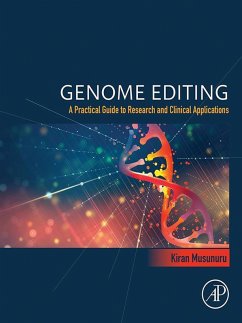Genome Editing: A Practical Guide to Research and Clinical Applications is geared towards investigators interested in learning how to use CRISPR-Cas9-based technologies, with a focus on cardiovascular research and clinical applications. Covering a range of topics from the basics of genome editing to design considerations, to assessments and applications, this reference allows readers to get started and establish a full workflow from the beginning of the project to its full completion. With worked examples drawn from real-life experiments, as well as troubleshooting and pitfalls to avoid, the book serves as an essential reference for researchers and investigators in both cardiovascular and biomedical research.
- Help readers familiarise with the variety of genome-editing approaches that are being applied in cardiovascular research and medicine, i.e., both research applications and clinical applications
- Understand the use of genome editing through worked examples (based on real-life experiments) in which CRISPR-Cas9 is employed, online tools to design CRISPR-Cas9 reagents, methods to interpret data from genome-editing experiments, the downsides of genome-editing technology - both the scientific and ethical pitfalls to avoid
- Written in an easy-to-follow manner, guiding readers from the design of the project to its completion
- Includes unpublished and new methods
Dieser Download kann aus rechtlichen Gründen nur mit Rechnungsadresse in A, B, BG, CY, CZ, D, DK, EW, E, FIN, F, GR, HR, H, IRL, I, LT, L, LR, M, NL, PL, P, R, S, SLO, SK ausgeliefert werden.


